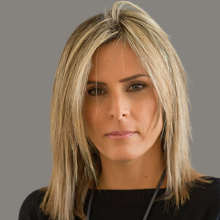Shapeshifting mathematics
Dr. Shachar Carmeli
New scientists

Dr. Shachar Carmeli
How did a kid who grew up in a tiny, remote community in northern Israel embark on a career in theoretical mathematics? According to newly recruited Weizmann Institute faculty member Dr. Shachar Carmeli, the decision to pursue this path was a bit of a toss-up.
“Some members of the mathematics community are prodigies, but not me,” he states. “I became interested in math only when I was a teenager, and even then, it had to compete with my very serious devotion to athletics, specifically, Thai boxing. Eventually, though, my math teacher encouraged me to apply to the Open University, where she was a lecturer, while I was still in high school.”
This academic fast-tracking, however, didn’t immediately translate into accelerated ambitions.
“After high school, I took a year off to volunteer as a counselor for a youth movement,” he says. “During this time, I wasn’t officially studying math―I was busy with the kids I was mentoring and was applying to various positions in the army―but I did read a lot. So when I was accepted into an academic IDF track that had me studying math and computer science at Tel Aviv University before beginning my active service, I was already familiar with some of what was taught in my courses.”
Competitive streak
While still in the military, Dr. Carmeli completed his master’s degree at the Weizmann Institute and also participated in the 2011 and 2012 International Mathematics Competition, which he describes as a terrific opportunity to make new friends.
“The whole point of these competitions is to take a lot of people interested in math and get them together. It’s a very social event,” he explains.
For a period of several years, he also helped train the Israeli team competing in the International Mathematical Olympiad for high schoolers.
Dr. Carmeli served in the Israel Defense Forces for over five years and commanded a research and development team. From there, it was back to the Weizmann Institute, where he pursued his PhD under the supervision of Prof. Dmitry Gourevitch, an expert on representation theory―a branch of mathematics that focuses on the symmetries of linear spaces.
Coffee and donuts
During his doctoral studies, Dr. Carmeli became fascinated with a different mathematical discipline, which he pursued in collaboration with Prof. Tomer Schlank and Dr. Lior Yanovski at the Hebrew University of Jerusalem.
This field, called homotropy theory, takes an algebraic approach to determining how a defined shape might be twisted or stretched into a different shape that is mathematically equivalent.
“It turns out algebra is very useful for describing continuous manipulations of geometric shapes,” Dr. Carmeli explains, adding that one famous example of homotopic equivalence is the topological symmetry between a coffee cup and a donut. “This is a topic that is relevant both to pure math―my own area of interest―and also has applications to other fields including physics and even data analysis.”
Since 2021, Dr. Carmeli has been pursuing postdoctoral research at the University of Copenhagen, which he says is a world center for mathematicians interested in homotropy theory.
“People who work in different sub-fields of mathematics can sometimes have trouble communicating with each other, but here, everybody speaks the same language,” he says. “My wife and I chose Copenhagen over possible postdoc locations in North America for another reason as well; we wanted to be in a time zone that made it easier to stay in touch with our families.”
The couple, today the parents of a two-year-old son, are now preparing to return to Israel, and Dr. Carmeli expects to be back on campus in September of 2024.
“On a professional and personal level, I’m happy to be coming back to work with my advisor and my other colleagues,” he says, adding that he also hopes to use what little free time he has “to return to my boxing training, which I had to leave aside while in Copenhagen. We’ll see how that works out.”
Education and select awards
-
BSc, Tel Aviv University (2012)
-
MSc (2016) and PhD (2021), Weizmann Institute of Science
-
Postdoc, Copenhagen Centre for Geometry and Topology, Copenhagen University (2021-2024)
-
Susan Sapir Memorial Prize for MSc students at the Weizmann Institute (2016); Adams Fellowship from the Israel Academy of Science and Humanities (2017-2021); Dimitris N. Chorafas Foundation Prize (2020); Haim Nessyahu Prize from the Israel Mathematical Union (2023)








